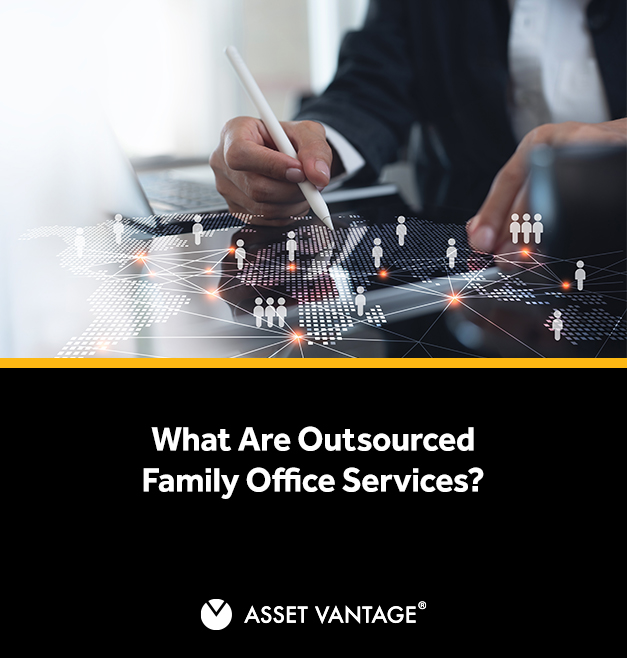Read Time9 Mins
- What Are Outsourced Family Office Services?
- The Spectrum of Outsourced Services
- When Does Outsourcing Make Sense for Families?
- Hybrid and Selective Outsourcing Models
- Comparing Outsourced Services to Other Models
- Benefits of Outsourcing for Wealthy Families
- Risks and Trade-Offs in Outsourcing
- Guardrails for Generations
What Are Outsourced Family Office Services?
Outsourced family office services are the delegation of family office functions to external professionals instead of maintaining a permanent in-house team.
Families can outsource administrative tasks, such as accounting, bill payment, payroll, and tax compliance, as well as strategic functions like financial reporting, financial planning, estate planning, and advanced tax optimization. The scope often includes advisory services, governance support, and customized solutions that serve the family’s financial assets and align with long-term objectives.
How Outsourcing Differs from Other Models
- Single-family offices build a permanent team. Outsourcing avoids payroll and overhead while still covering essential administrative tasks.
- Multi-family offices deliver bundled offerings to many families. Outsourcing allows families to maintain control and select only the functions they need.
- Virtual family offices rely mainly on cloud-based platforms. Outsourcing combines digital tools with human expertise, strengthening financial reporting and financial planning.
Outsourcing is not a stopgap but a structural decision. Families that attempt to manage complexity through fragmented advisors often face duplicated costs, inconsistent reporting, and governance gaps. Those that succeed are the ones who define what must remain in-house, delegate the rest without compromise, and hold providers accountable to family values, multigenerational priorities, and continuity across future generations.
The Spectrum of Outsourced Services
Core Accounting and Back Office Support
Financial Reporting and Real-Time Oversight
Advanced Tax Optimization and Compliance
Estate Planning and Legacy Structuring
Investment Reporting and Advisory Integration
Risk Management and Asset Protection
Concierge and Lifestyle Services
When Does Outsourcing Make Sense for Families?
Wealth and Complexity Thresholds
Situations That Justify Outsourcing
- Rising payroll and overhead, where reducing costs becomes urgent
- Governance frameworks that must serve multiple family members
- Real estate or private equity portfolios that demand sophisticated oversight
- Companies generating liquidity events that increase tax and compliance pressure
Cost Efficiency and Expertise Gaps
Cost & Trade-offs
| Family office events and conferences Model | Typical annual cost (USD) | Control & customization | Primary benefits | Primary trade-offs / when to avoid |
|---|---|---|---|---|
| Single-family office (SFO) | US$1M to US$10M+ | Very high. Fully tailored | Full control, bespoke governance, direct access to investment management | High fixed cost. Suitable only for substantial wealth and complex entity structures |
| Multi-family office (MFO) | US$100k to US$800k (per family, net of shared costs) | High but shared. Some customization | Cost efficiency, institutional capabilities, and access to private markets | Less privacy. Personalization often compromised |
| Selective outsourcing (modular) | US$50k to US$500k (depending on scope) | High control. Families pick functions | Pay for what you need, rapid access to expert talent, and lower overhead | Requires strong vendor governance and integration effort |
| Full outsourced provider (end-to-end) | US$200k to US$1M+ | Medium. Provider-led, can be tailored | Single vendor accountability, bundled services, technology plus people | Potential vendor lock-in. Risk to family values if governance is not retained |
| Virtual family office (VFO) | US$30k to US$200k | Medium. Tech first, lighter customization | Low fixed cost, fast setup, strong automation | Limited depth for complex tax, private markets, or entity management |
| Private banks/wealth managers | Fee-based (% AUM) plus product costs | Low. Product and advice-oriented | Investment access, credit, market execution | Not a substitute for governance, tax, or succession planning |
Hybrid and Selective Outsourcing Models
What Does a Hybrid Model Look Like?
Balancing Privacy, Control, and Expertise
Comparing Outsourced Services to Other Models
| Model | Control & alignment | Cost & efficiency | Governance & scope | Best suited for |
|---|---|---|---|---|
| Outsourced services | Medium to high. Families retain governance while delegating technical tasks. | Flexible, cost-efficient, numerous benefits from scale and expert access | Broad: tax optimization, financial reporting, risk management | Families seeking to reduce risk without hiring a whole team |
| In-house team | Very high. Full alignment with family values | High fixed cost, payroll-heavy | Tailored, but depends on the depth of staff expertise | Families with the scale to fund a dedicated family office |
| Multi-family office | Medium. Shared service structure | Economies of scale, bundled offerings | Comprehensive but less personalized | Families that want bundled services with cost efficiency |
| Virtual family office | Medium. Tech driven | Lean, efficient, and often the lowest cost | Narrower: depends on platforms and integrations | Families that value cutting-edge technology and lean operations |
| Private banks/wealth managers | Low. Product focused | Fee-based (% AUM), often opaque | Investment advice and credit access only | Families that prioritize investment access, not governance |
Outsourced vs In-House Teams
Outsourced vs Multi-Family Offices
Outsourced vs Virtual Family Offices
Outsourced vs Private Banks and Wealth Managers
Benefits of Outsourcing for Wealthy Families
Cost-Effective and Scalable
Access to Expert Talent and Sophisticated Strategies
Cutting Edge Technology and Cloud-Based Platforms
Future Proofing the Family Office
Risks and Trade-Offs in Outsourcing
Outsourced family office services bring scale and expertise, but they also introduce risks. Families that succeed know where outsourcing helps and where it can weaken control.
Privacy and Confidentiality Concerns
Less Direct Control Over Processes
Safeguards Families Should Implement
- Define reporting standards and service-level agreements
- Establish governance frameworks that set boundaries for providers
- Align tax planning, financial reporting, and compliance with long-term objectives
- Run periodic audits to confirm providers remain compliant







